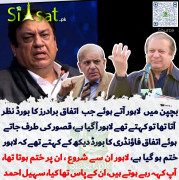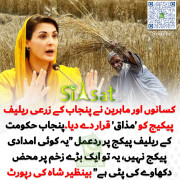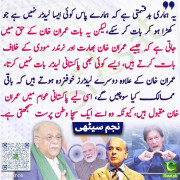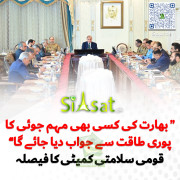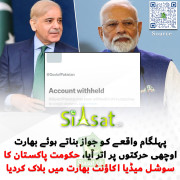For a Muslim, one of the most important obligations is to know the meaning of SHIRK, its seriousness and its different types, so that our Tawheed (belief in the Oneness of Allah) and our Islam may be complete, and our faith may be sound.
In terms of sharee’ah or Islamic terminology, shirk means ascribing a partner or rival to Allah in Lordship (ربوبییہ), worship or in His names and attributes. For example:
(Qur'an 6:14) قُلْ أَغَيْرَ اللَّهِ أَتَّخِذُ وَلِيًّا فَاطِرِ السَّمَاوَاتِ وَالْأَرْضِ وَهُوَ يُطْعِمُ وَلَا يُطْعَمُ ۗ قُلْ إِنِّي أُمِرْتُ أَنْ أَكُونَ أَوَّلَ مَنْ أَسْلَمَ ۖ وَلَا تَكُونَنَّ مِنَ الْمُشْرِكِينَ
Say: "Shall I take for my protector any other than Allah, the Maker of the heavens and the earth? And He it is that feedeth but is not fed." Say: "Nay! but I am commanded to be the first of those who bow to Allah (in Islam), and be not thou of the company of those who join gods with Allah."
کہہ دو جو الله آُسمانوں اور زمین کا بنانے والا ہے کیا اس کے سوا کسی اور کو اپنا مددگار بناؤں اور وہ سب کو کھلاتا ہے اور اسے کوئی نہیں کھلاتا کہہ دو مجھے تو حکم دیا گیا ہے کہ سب سے پہلے اس کا فرمانبردار ہو جاؤں اور تو ہرگز مشرکوں میں شامل نہ ہو
Above verse (Qur'an 6:14) may be considered to understand that somebody who makes helpers (مددگار) beside Allah (غائب میں) would be considered as if he/she has joined the company of “Mushrikeen”, (الْمُشْرِكِينَ). Note: The term “غائب میں” would be explained in detail later in this thread.
Another verse:
(72:20) قُلْ إِنَّمَا أَدْعُو رَبِّي وَلَا أُشْرِكُ بِهِ أَحَدًا
Say (O Muhammad صلى الله عليه وسلم): "I invoke only my Lord (Allah Alone), and I associate none as partners along with Him."
کہہ دو میں تو اپنے رب ہی کو پکارتا ہوں اور اس کے ساتھ کسی کوبھی شریک نہیں کرتا
It is very clear from above verse that invoking (پکارنا) someone other than Allah is SHIRK.
Following is the verse from First Surah of Qur’an:
(Qur'an 1:5) إِيَّاكَ نَعْبُدُ وَإِيَّاكَ نَسْتَعِينُ
It is You we worship and You we ask for help.
ہم تیری ہی عبادت کرتے ہیں اور تجھ ہی سے مدد مانگتے ہیں
There is another verse, (Qur'an 4:82):
أَفَلَا يَتَدَبَّرُونَ الْقُرْآنَ ۚ وَلَوْ كَانَ مِنْ عِندِ غَيْرِ اللَّهِ لَوَجَدُوا فِيهِ اخْتِلَافًا كَثِيرًا
Do they not then consider the Qur'an carefully? Had it been from other than Allah, they would surely have found therein many a contradiction.
کیا یہ لوگ قرآن میں غور نہیں کرتے اور اگر یہ قرآن سوائے الله کے کسی اور کی طرف سے ہوتا تو وہ اس میں بہت اختلاف پاتے
If first Sarah of Qur’an says “اور تجھ ہی سے مدد مانگتے ہیں” then you will not find any other Surah till end of Qur’an where you can prove “یا علی مدد” or “یا شیخ عبدالقادر جیلانی مدد” because as per above verse 4:82, “اور اگر یہ قرآن سوائے الله کے کسی اور کی طرف سے ہوتا تو وہ اس میں بہت اختلاف پاتے”. In verse 1:5, it is categorically denied to ask help (غائب میں) anybody accept Allah, (غائب میں مدد = دعا).
Now, try to understand with an example, if you are sitting in front of me and I say to you “please help me bringing drinking water for me”, then you becomes physical source/ physical means, “Asbab” (اسباب), to help me and hence it is NOT SHIRK, read the following verse, (Qur'an 5:2),
click here for complete verse with translation:
"اور آپس میں نیک کام اور پرہیز گاری پر مدد کرو اورگناہ اور ظلم پر مدد نہ کرو" (Qur'an 5:2)
For physical means (ظاہری اسباب), Prophet Muhammad ﷺ asked his companions (صحابہ کرام) for help. Also, for physical means (ظاہری اسباب), Prophet Essa (عَلَيْهِ ٱلسَّلَامُ) asked for help from his companions, as per
(Qur'an 3:52) (Note: for complete verse with translation, click here):
"
جب عیسیٰ نے بنی اسرائیل کاکفر معلوم کیا تو کہاکہ الله کی راہ میں کون میرا مددگار ہے حواریو ں نے کہا ہم الله کے دین کی مدد کرنے والے"
Now, if the person I just asked for drinking water, is actually in Baghdad or is buried inside a grave in Baghdad, then if I repeat the same sentence, while I am in Pakistan, the same sentence, “Give me drinking water” will become SHIRK. Because now I am calling that person in “Ghaib” (غائب). Hence the appropriate translation of ‘’ وَإِيَّاكَ نَسْتَعِينُ’ becomes “دعا صرف اللہ ہی سے ہے”- we call only Allah for help, in “Ghaib” (غائب).
Let’s consider the following verse, which was revealed specifically for the Prophet Muhammad ﷺ, (Qur'an 66:4)
Note: complete verse with translation click here) :
اور اگر پیغمبر (کی ایذا) پر باہم اعانت کرو گی تو خدا اور جبریل اور نیک کردار مسلمان ان کے حامی (اور دوستدار) ہیں۔ اور ان کے علاوہ (اور) فرشتے بھی مددگار ہیں
Here Allah tells (interpretation of meaning) that Allah and Jibrael, and righteous of the believers (نیک کردار مسلمان) are helpers (مددگار) of the Prophet Muhammad ﷺ. Prophet Muhammad ﷺ always called Allah directly (for help) and never said (“یا جبریل مدد” (أستغفر الله or never called (for help) his Saheed uncle [(یا حمزا مدد (أستغفر الله] although he (رضي الله عنه) was among the righteous of the believers.
It’s mean that Allah has attached Jibrael and righteous of the believers (نیک کردار مسلمان) to help Prophet Muhammad ﷺ with His authority, and these believers were ready to die upon any order of Prophet Muhammad ﷺ.
Now consider another verse, (Qur'an 8:9) Note: complete verse with translation click here):
"جب تم اپنے رب سے فریاد کر رہے تھے اس نے جواب میں فرمایا کہ میں تمہاری مدد کے لیے پے درپے ایک ہزار فرشتے بھیج رہا ہوں"
Did Prophet Muhammad ﷺ called Angels for help [ (یا جبریل مدد (أستغفر الله]? No, not at all, he ﷺ, according to above verse, only called Allah for help. In response, Allah send Angels to help him. But if someone calls Angels directly for help, it becomes SHIRK. Calling for help in “Ghaib” is only for Allah (پکارنا صرف اللہ کے لئے ہے), Ya Allah Madad (یا الله مدد) NOT [یا علی مدد )أستغفر الله)] NOT [یا غوث اعظم مدد (أستغفر الله)].
I have sufficiently enough explained that Sahabah e Karam were there to help Prophet Muhammad ﷺ in physical means (ظاہری اسباب), still someone would say that according to
Sahih Bukhari (2942) and Sahih Muslim (6223), Prophet Muhammad ﷺ called Ali (رضي الله عنه) for help during Ghazwa e Khyber (غزوہ خیبر). Here, it is very clear that Prophet Muhammad ﷺ called Ali (رضي الله عنه) for physical means (ظاہری اسباب). Prophet Muhammad ﷺ did not called Ali (رضي الله عنه) in Ghaib (غائب) as he (رضي الله عنه) was in front of him ﷺ. To call anybody except Allah in Ghaib (غائب) is SHIRK, that is why, Prophet Muhammad ﷺ did not called (for help) his uncle, Hamza (رضي الله عنه), who was a great warrior and was Shaheed during Ghazwa e Ahad (غزوہ احد).
If Ali (رضي الله عنه) were alive and standing in front of us today, then we would not hesitate to ask Ali (رضي الله عنه) for help. Since Ali (رضي الله عنه) was Shaheed and now is in Alam e Barzukh (عالم برزخ) and has no contact with this world, if we ask help from him now it becomes pure SHIRK and a Unforgivable Sin. اَللَّهُمَّ أَجِرْنِي مِنَ النَّارِ.
At the end I would like to make it clear that it is not a matter of debate whether Ali (رضي الله عنه) or Sheikh Abdul Qadir Jilani are capable to help anyone now or not. Assuming, even if they were capable to help , it would be SHIRK to call them in Duaa (دعا) because دعا صرف اللہ کے لیے ہے .
Why? Let's consider following example:
Who brings the rain? Allah
Whose duty is that? Angels
Are we going to pray for rain, from Allah or Angels? Obviously, Allah.
If somebody start pray Angels to bring rain then it is violation of verse “وَإِيَّاكَ نَسْتَعِينُ” and hence pure SHIRK.
Allah says in Qur’an:
(Qur'an 2:186) وَإِذَا سَأَلَكَ عِبَادِي عَنِّي فَإِنِّي قَرِيبٌ ۖ أُجِيبُ دَعْوَةَ الدَّاعِ إِذَا دَعَانِ ۖ فَلْيَسْتَجِيبُوا لِي وَلْيُؤْمِنُوا بِي لَعَلَّهُمْ يَرْشُدُونَ
And when My servants ask you, [O Muhammad], concerning Me - indeed I am near. I respond to the invocation of the supplicant when he calls upon Me. So let them respond to Me [by obedience] and believe in Me that they may be [rightly] guided.
اور جب آپ سےمیرے بندے میرے متعلق سوال کریں تو میں نزدیک ہوں دعا کرنے والے کی دعا قبول کرتا ہوں جب وہ مجھے پکارتا ہے پھر چاہیئے کہ میرا حکم مانیں اور مجھ پر ایمان لائیں تاکہ وہ ہدایت پائیں
Allah never put any protocol in place (الله نے کبھی کوئی پروٹوکول نہیں رکھا).
He (الله) says, I (الله) respond to the invocation (پکار) of the supplicant (دعا) when he calls upon Me (الله).
